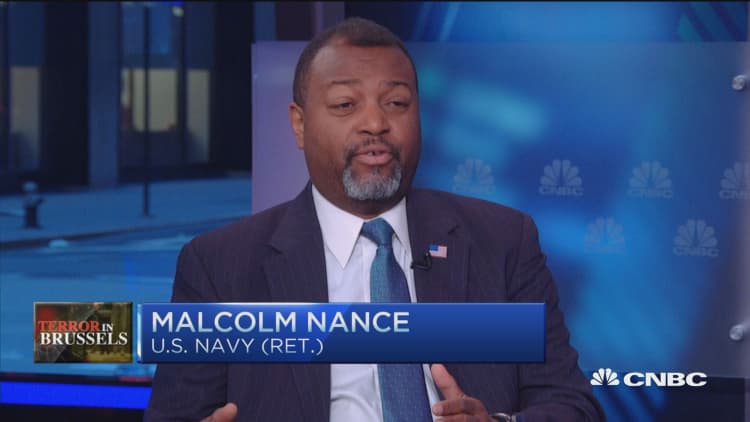
European intelligence and law enforcement agencies are too fragmented to thwart terrorist threats, former U.S. naval intelligence officer Malcolm Nance said Thursday.
Nance, who now heads the think tank Terrorism Asymmetrics Project, said Europe needs a coordinated task force capable of taking a more intelligence-directed approach to defeating terrorist networks, particularly ISIS, which claimed responsibility for deadly bombings in Brussels this week.
"You have 28 nations, but you have about 500 small police forces, no national integrated terrorism task force like we have here in the United States. So the EU is going to have to take a holistic approach to that," he told CNBC's "Squawk Box."
Creating a task force would allow countries to send personnel from one country to another in times of need, Nance said.
One option is for NATO to take the lead in crating a more coordinated approach, Nance said.
"It's the only umbrella organization that has the capacity to flow intelligence and manpower like that," he said. "It can be resourced up."
Following terror attacks, Belgian and French military personnel are on the streets to the point where the countries are essentially "occupying themselves," he said.
"If they don't do something at the intelligence level and the law enforcement level they're going to have soldiers remaining on the street," he said.
Turkish President Tayyip Erdogan on Wednesday said Turkey had deported one of the Brussels suicide bombers, identified as Ibrahim El Bakraoui, after he was detained near the Syrian border. Turkey said it had told the Netherlands and Belgium that Bakraoui was a militant fighter, but the warning was ignored, according to news reports.
Marc Ginsberg, former U.S. ambassador to Morocco, said Thursday the incident demonstrates that European laws are too lax because they lack the authority to arrest suspected terrorists without evidence of having carried out an attack.
He, too, said Europe needs to better coordinate its counter-terrorism efforts, adding that even within Belgium, intelligence agencies do not adequately share information.
"The Europeans can talk all they want about this being an attack on the liberty and on the status of the European Union, but until they get control of coalescing and sharing biometric data and intelligence, these attacks are going to continue," Ginsberg told CNBC's "Squawk Alley."
Retired U.S. Army Col. Jack Jacobs said the European Union's loose confederacy without border controls presents a target for ISIS.
"It sounded great from an economic standpoint" to unite Europe, he told CNBC's "Squawk on the Street." "From sociological standpoint, from a political standpoint, from a security standpoint, it's extremely difficult to deal with."
Second- and third-generation immigrants in Belgium are completely disaffected, and socio-economic problems in their communities have contributed to radicalization, he added.






